The Little Prince
By antoine de saint-exupery, the little prince essay questions.
What is the purpose of the Turkish astronomer in the story as a whole?
The story of the Turkish astronomer critiques the way grownups perceive the world. The first time the astronomer talked about Asteroid B-612, nobody took him seriously due to his appearance; this comments on the superficiality of the society we live in. However, when the Turkish astronomer presents the same exact information in "normal" or Western clothing, all of the "Big People" believe him and take his information into account. This little anecdote is placed at the beginning of the book and presents one of the most prominent themes in the book: children versus adults. The story clearly portrays the vanity of grownups, which is later analyzed in their love for numbers such as prices, percentages, and checks. Children, on the other hand, view things without judgment and look at the true beauty in the world.
Discuss the little prince and his relationship with the flower.
At first, when the flower magically appears on the prince's planet, the prince falls head over heels for it. The flower proclaims its uniqueness and portrays itself as the only rose in the whole world. The prince meets the flower’s every little petty desire. When the flower wants to be watered, the prince does just that; when it claims it needs a glass cover to protect itself from tigers, the prince builds one and shields it. However, as time passes, the prince gets rather annoyed with the flower and when he is about to leave, the flower begins to act in a more humble demeanor, yet remains too proud to ask the prince to stay. The flower even tells the prince to take off its glass cover and admits it is a plant.
When the prince begins his journey in the universe, he remembers his flower and misses it. The prince, in fact, feels regretful of leaving such a fragile creature alone on his asteroid. He feels this way until he runs into a garden full of roses and realizes that his flower lied to him and that there are thousands of flowers like it in the world. In that moment, the prince despises the flower. Nevertheless, the fox teaches the prince that regardless of there being thousands of flowers like his own, the one on his planet will always be unique to him because they love each other and he put work into taking care of her. Towards the end of the story, the prince begins to love his flower once again and hopes to return to her.
How is the motif of time represented in the story?
Whenever the prince meets a grownup, he realizes that they are all concerned with one thing: saving time. This is clear on the planet of the geographer, who claims he has no time to explore the world because he is in charge of recording it in his book (ironically, the book the geographer is so busy filling up is empty). Later, when the prince meets a vendor of pills that substitute for drinking water, the salesman tells the prince that adults don't want to even waste their time on something as indispensable as drinking water. The same idea is represented when the prince sees people on trains. In that moment, he is informed that the adults don't even bother looking out of their windows because of the fear they have of wasting their time. Through these encounters, Saint-Exupéry demonstrates that being patient, rethinking what is actually serious, and living an authentic life are more important than saving time.
What can readers learn from the prince?
The prince is young but he has much to offer readers. He is curious about everything and asks questions rather than take things at face value or not seek to learn more about the world around him. He is not affected by the vices of adults such as greed, hubris, lack of creativity, and willful ignorance. He is interested in cultivating meaningful relationships and eventually learns that the things that really matter are invisible rather than on the surface. He finds beauty in nature, works assiduously for others, and seeks to get to the heart of things. Readers can glean all of these characteristics of the prince quite easily and infer that Saint-Exupéry believes they ought to embrace the prince's values.
Is this a story for children, adults, or both?
On the one hand, this novel seems like it is for children. It is short, full of pictures, filled with fantastical elements, and centers on a small boy. Its prose is simple and its message putatively clear. On the other hand, the novel is not that straightforward. It deals with depression and isolation and death, and there is little resolution. Its tone and mood are melancholy and pensive. The prose is simple but full of metaphors and symbols. Thus, the novel is appropriate for both adults and children; this is no doubt why it is so popular worldwide.


The Little Prince Questions and Answers
The Question and Answer section for The Little Prince is a great resource to ask questions, find answers, and discuss the novel.
Who is the inhabitant of The Little Prince's shortest visit?
The inhabitant is a conceited man.
Why does the little girl have the jar of pennies?
I see no evidence of a little girl with a jar of pennies or coins in the text.... chapter?
Fully describe the appearance of the Little Prince.
The Little Prince was a little man with golden hair. He wore a blue jacket with burgandy lapels and cuffs, golden stars attached to his soldiers, knee-high blue boots, and he carried a sword.
Study Guide for The Little Prince
The Little Prince study guide contains a biography of Antoine de Saint-Exupery, literature essays, quiz questions, major themes, characters, and a full summary and analysis.
- About The Little Prince
- The Little Prince Summary
- Character List
Essays for The Little Prince
The Little Prince essays are academic essays for citation. These papers were written primarily by students and provide critical analysis of The Little Prince by Antoine de Saint-Exupery.
- Disguised Imperfections: Human Nature in "The Little Prince," "The Mirror Maker," and "The Nose"
- Matters of Consequence in "The Little Prince": Comparing Childhood and Adulthood
Lesson Plan for The Little Prince
- About the Author
- Study Objectives
- Common Core Standards
- Introduction to The Little Prince
- Relationship to Other Books
- Bringing in Technology
- Notes to the Teacher
- Related Links
- The Little Prince Bibliography
Wikipedia Entries for The Little Prince
- Introduction
- Tone and writing style
- Inspirations

The Little Prince
Antoine de saint-exupéry, everything you need for every book you read..
Relationships
Both the pilot's and the prince's stories revolve around their relationships. For the pilot, the entire purpose of writing the story and making his drawings is to remember his relationship with the little prince. The little prince, in turn, tells the story of his journey in terms of the characters he's met along the way. The chapter with the fox , in particular, emphasizes the importance of taking time to get to know someone. The…
The True and the Essential
At the beginning of his journey, the little prince is most concerned with the truth. He leaves his planet after catching his rose telling a lie, and although they reconcile just before he departs, he decides to explore the universe in order to discover what's true. As he encounters more on his travels, however, he realizes that what's true is not always what's essential—his rose's lies were less important than the fact that he cared…
Exploration vs. Narrowmindedness
The two main characters of the book— the pilot and the little prince —are both explorers, in a very literal sense, but also in a figurative sense. Compared to those characters that inhabit only their own tiny planets and homes, the pilot and the prince have traveled and gained more perspective on life and the universe. While the others are caught up adding sums, drinking, ruling over imaginary subjects, or completing other futile projects, these…
Childhood vs. Adulthood
The story often compares children to grownups, depicting grownups as a group of people who have lost their sense of imagination and the ability to see what's essential. The various grownups presented throughout the story have only utilitarian concerns and are ruled by vices like pride and greed. Unlike children, they've lost the ability to understand the true value of a friendship, the beauty of a house, or the things that aren't explicitly shown in…
Innocence is a trait that both the pilot and the little prince value. For the pilot, the little prince's innocence makes it important to protect and comfort him. For the little prince, his rose's naïveté similarly makes it important for him to return to his planet to protect her. Innocence itself serves as protection as well—when the little prince encounters the snake , the snake refrains from poisoning the boy because of his innocence.

- study guides
- lesson plans
- homework help
The Little Prince Essay Topics & Writing Assignments
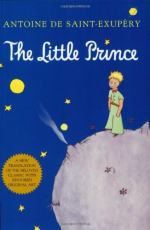
Essay Topic 1
In the book's dedication the author, Antoine de Saint-Exupery, dedicates the book to his friend Leon Werth. Then the author changes the dedication slightly. How does he change the dedication and how does that change tie in with the theme of the book?
Essay Topic 2
In The Little Prince none of the characters are given regular names. They are all identified by a title. This is a very common practice in fables. Why is a fable about types of characters and not specific individuals?
Essay Topic 3
The author of The Little Princ" both wrote the words and illustrated the book. His illustrations are very childlike.
1) Why is this important? Why didn't he get someone to illustrate the book with color photographs, charts and maps?
2) What effect do these simple drawings have on the reader?
Essay Topic 4
The fox and snake are common animals in fiction, and...
(read more Essay Topics)

FOLLOW BOOKRAGS:
The Little Prince
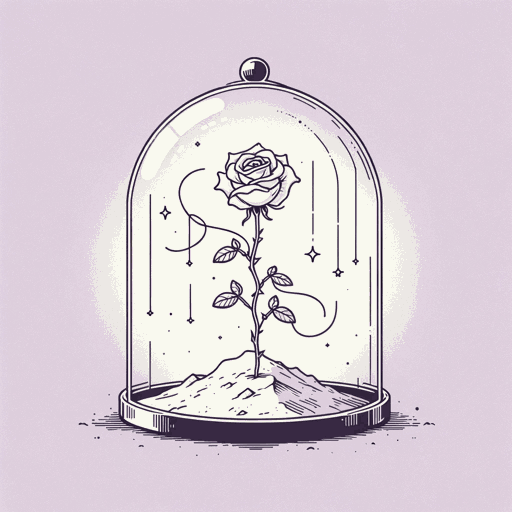
80 pages • 2 hours read
A modern alternative to SparkNotes and CliffsNotes, SuperSummary offers high-quality Study Guides with detailed chapter summaries and analysis of major themes, characters, and more. For select classroom titles, we also provide Teaching Guides with discussion and quiz questions to prompt student engagement.
Chapter Summaries & Analyses
Chapters 1-2
Chapters 3-6
Chapters 7-9
Chapters 10-12
Chapters 13-15
Chapters 16-19
Chapters 20-21
Chapters 22-24
Chapters 25-27
Character Analysis
Symbols & Motifs
Important Quotes
Essay Topics
Discussion Questions
Discussion Questions Beta
Use the dropdowns below to tailor your questions by title, pre- or post-reading status, topic, and the difficulty level that suits your audience. Click "Generate," and that's it! Your set of ready-to-discuss questions will populate in seconds.
Select and customize your discussion questions!
Your Discussion Questions
Your results will show here.
Inspired by SuperSummary, powered by AI.
Our AI tools are evolving, sometimes exhibiting inaccuracies or biases that don't align with our principles. Discover how AI and expert content drive our innovative tools. Read more
Related Titles
By Antoine de Saint-Exupéry

Wind, Sand, and Stars
Antoine de Saint-Exupéry
Featured Collections
French literature.
View Collection
Juvenile Literature
Summer reading, supersummary staff picks.
- Search Results
7 timeless life lessons from The Little Prince
From lessons on kindness to caring for our environment, the messages in this enchanting fable are as important today as they ever were.
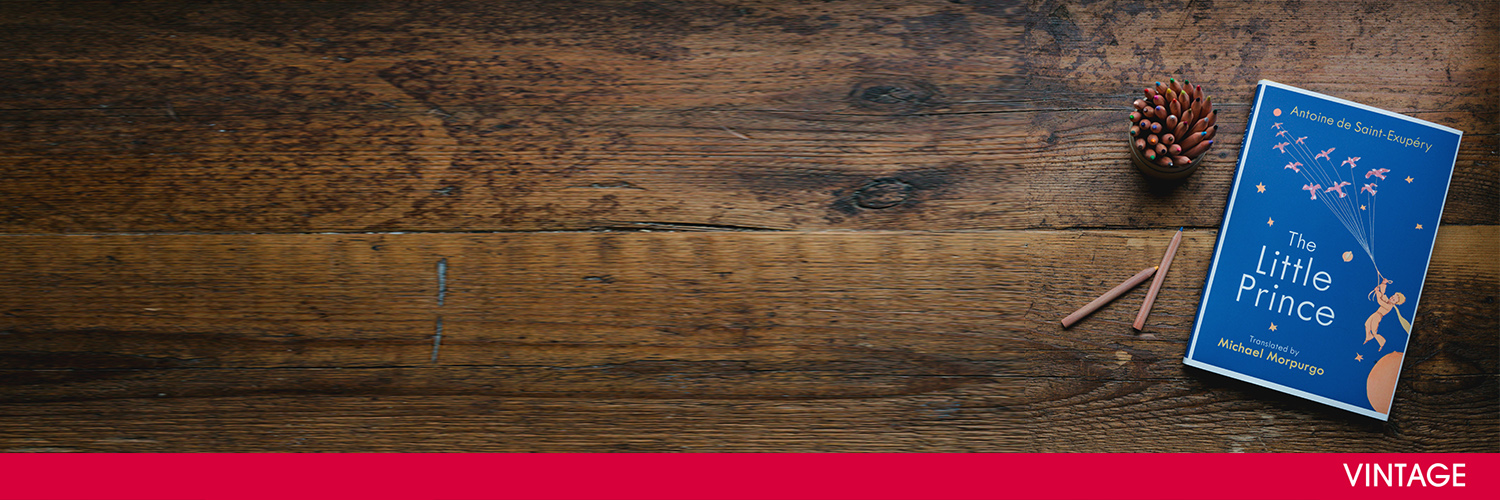
The Little Prince has captured the hearts of readers around the world since he first appeared in 1943. Written by pilot Antoine de Saint-Exupéry while in America, the tale was inspired by his experiences in the French Air Force. On the surface it’s a simple story, but this little prince is as wise as they come and his messages of compassion and goodwill continue to endure. Here are seven life lessons we can learn from this enchanting tale, as told through quotes.
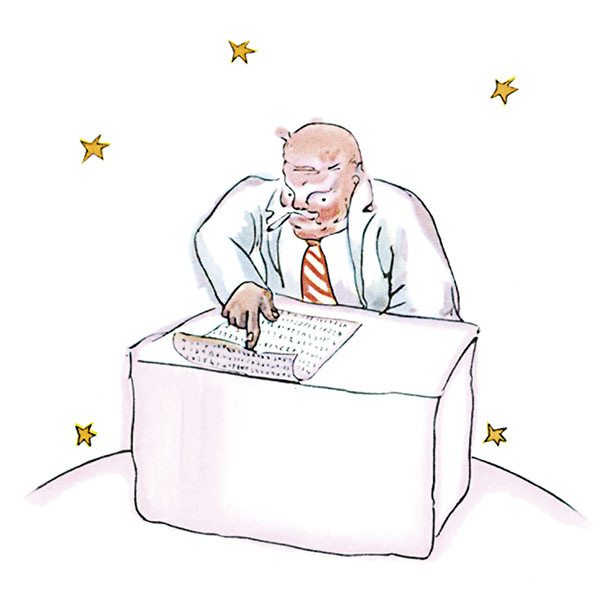
1. Don’t be too fond of numbers
‘Grown-ups are very fond of numbers. When you tell them about a new friend, they never ask you the kind of questions that should be asked, such as: “What kind of voice does he have?” “What are his favourite games?” “Does he collect butterflies?” Instead they ask: “How old is he? How much money does his father earn?” They really do imagine this is the best way to discover what sort of person he is!’
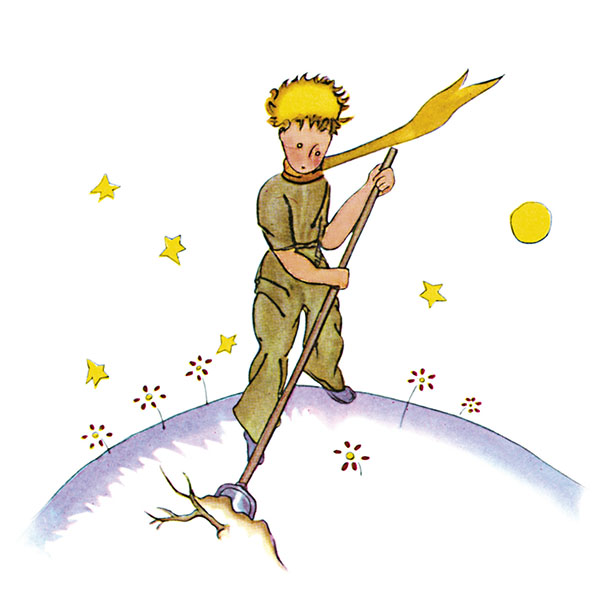
2. Look after the planet
‘“It’s a just a question of self-discipline,” the little prince explained later. “First thing in the morning you look after yourself, you brush your teeth and wash your face, don’t you? Well, the second thing you must do is to look after the planet.”’
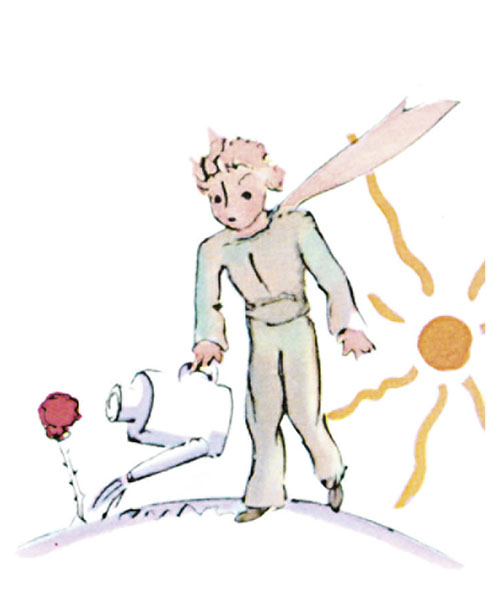
3. Don’t judge others by their words, but by what they do
‘“[My rose] filled me with her fragrance, she had brought joy to my life. I should never leave her. I should have recognised what a sensitive sweet soul there was under all her rather silly games.’”
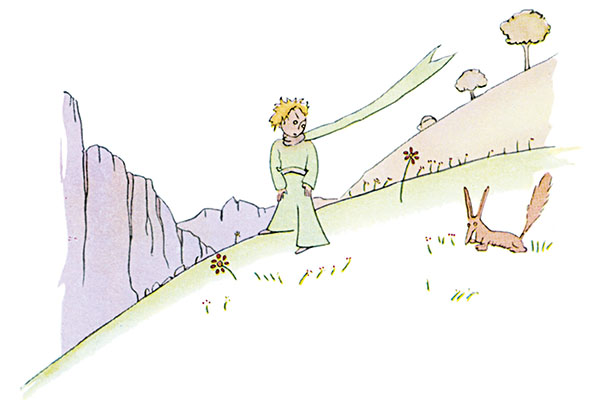
4. Relationships make life worth living
‘“What exactly does ‘tamed’ mean?”
“Well, it’s something too often forgotten,” said the fox. “I suppose it means: to make some kind of relationship.”
“Relationship?”
“Yes,” said the fox. “I’ll explain. To me, you are just a just a little boy like any other, like a hundred thousand other little boys. I have no need of you and you have no need of me. To you I am a fox like any other, like a hundred thousand other foxes. But if you tame me, you and I, we will have created a relationship, and so we will need one another. You will be unique in the world for me… If you were to tame me, my whole life would be so much more fun. I would come to know the sound of your footstep, and it would be different from all the others. At the sound of any other footstep I would be down in my hole in the earth as quick as you like. But your footstep would be like music to my ears, and I would come running up out of my hole, quick as you like.”

5. The important things in life you cannot see with your eyes, only with your heart
‘Once the little prince fell asleep, I picked him up in my arms and set off on my way again. I was so moved as I walked. It seemed to me that I was carrying in my arms the most delicate of treasures, that there could be nothing more fragile on the whole Earth. In the light of the moon I looked down at this pale forehead, those closed eyes, those locks of his that trembled in the wind: “What I am seeing,” I thought, “is no more than the shell. What is truly important I cannot see.”
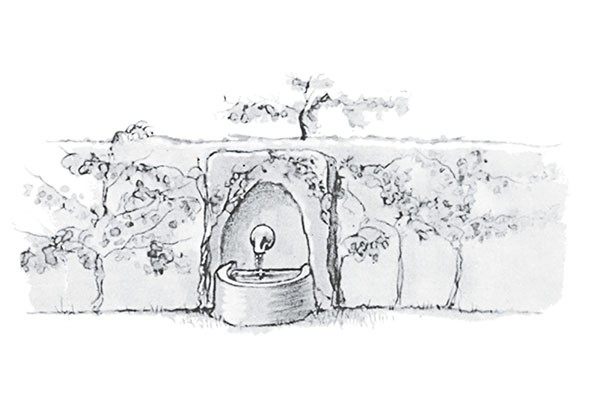
6. It is the time you give to something that makes it precious
‘I lifted the bucket to his lips. He drank, his eyes closed. Then I drank. It was like a feast of water. This was not ordinary food of course, but it might just as well have been. The sweetness of this water was born from the long walk under the stars, from the song of the pulley, and for the effort of pulling up that bucket. It made me feel good, made me happy, as a present does.’
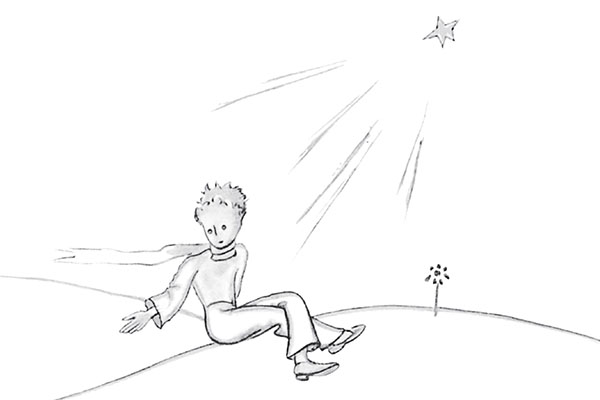
7. And finally, remember to look up at the stars
‘“Stars mean different things to different people. For travellers, stars tell them where they are, where they are going. For others, they are just little lights in the sky. For scholars, they are the world of the unknown, yet to be discovered and understood. For my business man, they are gold. But all stars stay silent. And you? No one else in the world will see the stars as you do… For you, and only for you, the stars will always be laughing.”’
The Little Prince, translated by Michael Morpurgo with audiobook read by Richard E. Grant is out now.
Sign up to the VINTAGE Books newsletter
By signing up, I confirm that I'm over 16. To find out what personal data we collect and how we use it, please visit our Privacy Policy .
Sign up to the Penguin Newsletter
By signing up, I confirm that I'm over 16. To find out what personal data we collect and how we use it, please visit our Privacy Policy
The Little Prince Essay
The Little Prince is a novella written by Antoine de Saint-Exupéry. The story is about a young prince who leaves his home planet to explore other worlds. He meets different people and learns about the importance of relationships and love. The Little Prince is a timeless classic that teaches important life lessons.
In the form of a parable or fable, the book is set up as a variety of creatures and animals are given the capacity to speak and reveal vital information regarding politics and the planet.
The story revolves around a young prince who is stranded on a small planet and is forced to come to terms with the harsh realities of life. The Little Prince is an enduring classic that has been translated into over 250 languages and has sold millions of copies worldwide.
The novel has been praised for its simple but poignant prose, its rich metaphorical meanings, and its timeless themes. It has also been criticized for its elitist attitude and Saint-Exupéry’s apparent idealization of aristocracy. No matter what perspective it is viewed from, The Little Prince remains one of the most beloved and well-known works of fiction in history.
The Pilot tells the tale, after crashing his plane in the Sahara desert. After surviving in the desert, The Little Prince takes The Pilot and readers on a trip through time, sharing numerous instructive tales based on his own personal experience and research.
The Little Prince talks about his journey from planet to planet, and how each stop has taught him something important. He also reflects on the nature of love, wisdom, and sadness. The story ends with The Little Prince departing back to his own planet, but leaves behind a lasting impression on The Pilot who is forever changed by their encounter.
Antoine de Saint-Exupéry’s The Little Prince is a timeless story that has been enchanting readers for generations. The novel tells the tale of a young boy who travels to different planets in order to learn about life. On his journey, the little prince meets different people and learns valuable lessons about love, wisdom, and sadness. The story concludes with the little prince returning home, but not before imparting his wisdom onto the pilot who has been changed by their encounter. The Little Prince is a charming and insightful read that will stay with you long after you finish the last page.
The bulk of the book is made up of The Little Prince telling tales from his own planet as well as others he had seen, including strange people he’d encountered. He also tells the story of a fox who taught him a lesson about love, friendship, and relationships by teaching him to see beyond appearances.
The Little Prince is able to learn a great deal about life and the meaning of it, thanks to the fox. The story concludes with The Little Prince finally returning to his own planet, after he has learned everything he needs to know. Antoine de Saint-Exupéry manages to beautifully weave a tale that is both philosophical and magical at the same time, making it a classic for all ages.
The book is written in the form of a fairytale, and it contains many drawings by Saint-Exupéry himself. To summarize, it may be appreciated by both children and adults, to make of it what they will. The novel mocks adult populators who are devoid of inspiration and emotion but instead see things from a narrow, materialistic viewpoint in contrast with youngsters who view the world through their hearts rather than their eyes.
The Little Prince is a pilot stranded in the desert after his plane crashes. He encounters a small boy who lives on an asteroid and who tells him the story of his journey from planet to planet. The Little Prince travels to different planets, each inhabited by a different kind of creature.
The most memorable is perhaps the king who wants The Little Prince to rule over his people as a conqueror. The Little Prince ultimately decides to return home to his asteroid, where he finds that he has been gone for many years and that everyone he knew has long since died. In the end, The Little Prince learns that it is only through love and imagination that we can find true happiness.
Saint-Exupéry’s novel is a timeless classic for all ages and a poignant reminder of the importance of love and imagination. The story is narrated in a simple, poetic style that is easy to read and understand. The illustrations are charming and add to the overall charm of the novel. The Little Prince is definitely a must-read for fans of fairytales and coming-of-age stories.
Based on the novella by Antoine de Saint-Exupery, this fantastic musical fable begins as a pilot lands his plane in the barren Sahara Desert. He is met by a tiny prince from Asteroid B-612, who becomes his guide and mentor.
The prince has left his tiny world to explore the universe and learn about other cultures. The pilot becomes the little prince’s tutor, sharing stories of his adventures in the skies. The two friends soon discover that they have more in common than first thought. The prince needs to return home to save his planet from an impending disaster, but not before teaching the pilot some invaluable lessons about life.
The Little Prince is a novel written by Antoine de Saint-Exupéry. The story is about a pilot who is stranded in the desert and meets a little boy who is a prince on a planet. The pilot becomes the little prince’s tutor, sharing stories of his adventures in the skies.
The two friends soon discover that they have more in common than first thought. The prince needs to return home to save his planet from an impending disaster, but not before teaching the pilot some invaluable lessons about life. The Little Prince is a novel that teaches valuable life lessons. It is a must-read for anyone who wants to learn more about life and how to appreciate the simple things in life.
More Essays
- Harold Prince’s Theory On Concept Musicals Essay
- Essay about Machiavelli: How To Become A Prestige Prince
- Machiavelli’s The Prince Analysis Essay
- Essay about Machiavelli The Prince Summary Chapter 18
- Essay about Niccolo Machiavellis The Prince
- Machiavellis The Prince: The Origins Of Politics Essay
- Essay on Machiavelli’s The Prince: Questions And Answers
- Machiavelli’s The Prince: Summary And Analysis Research Paper
- Essay on Personal Narrative: Jump Mahad Jump
- Comparing French And Chinese Cinderella Stories Essay

Leave a Comment Cancel reply
Save my name, email, and website in this browser for the next time I comment.
Home — Essay Samples — Literature — The Little Prince — Analysis Of The Little Prince From A Philosophical Point Of View
Analysis of The Little Prince from a Philosophical Point of View
- Categories: The Little Prince
About this sample

Words: 1951 |
10 min read
Published: Aug 6, 2021
Words: 1951 | Pages: 4 | 10 min read
- 'Micro-evil' - evil within a certain person
- 'Macro-evil'- is evil in general.
Storylines and features of the composition of the tale
Summarizing the study.

Cite this Essay
Let us write you an essay from scratch
- 450+ experts on 30 subjects ready to help
- Custom essay delivered in as few as 3 hours
Get high-quality help

Dr. Karlyna PhD
Verified writer
- Expert in: Literature

+ 120 experts online
By clicking “Check Writers’ Offers”, you agree to our terms of service and privacy policy . We’ll occasionally send you promo and account related email
No need to pay just yet!
Related Essays
3.5 pages / 2123 words
2 pages / 964 words
2 pages / 888 words
1.5 pages / 762 words
Remember! This is just a sample.
You can get your custom paper by one of our expert writers.
121 writers online
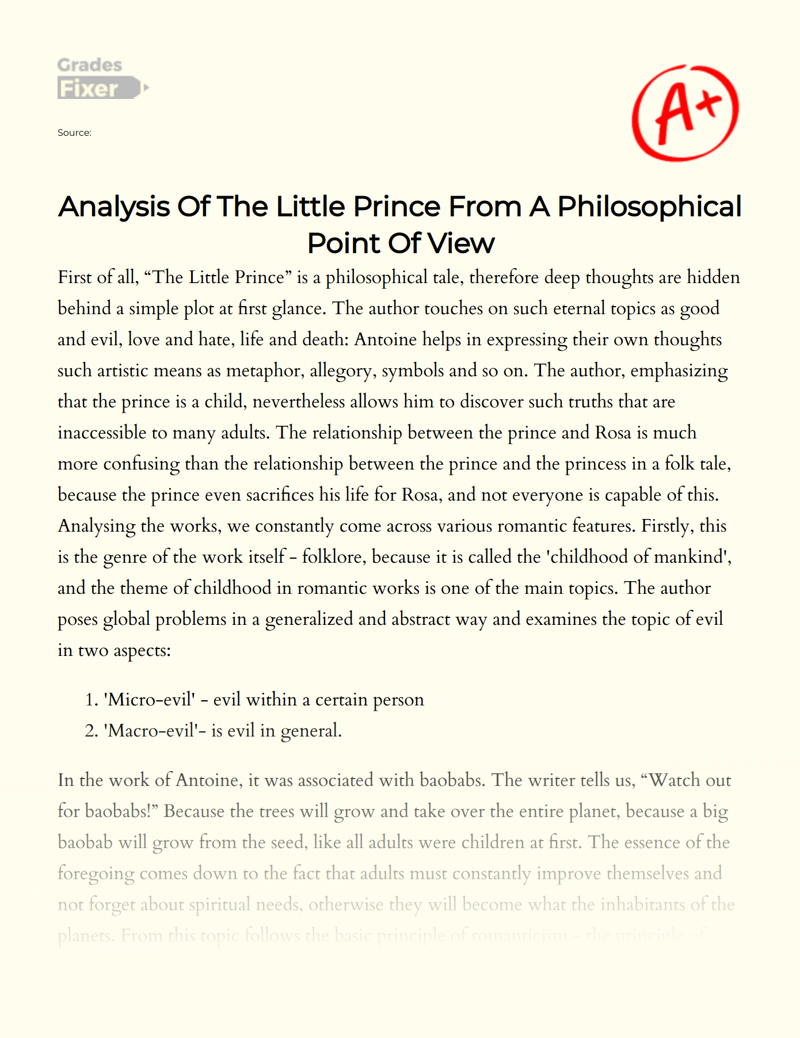
Still can’t find what you need?
Browse our vast selection of original essay samples, each expertly formatted and styled
Related Essays on The Little Prince
In Antoine de Saint Exupery’s short narrative “The Little Prince”, the division between adults and children is clearly defined through their use of imagination. The typical adult perspective is irrational and close minded. [...]
The fear of a dystopian future that is explored in both Fritz Lang’s film Metropolis and George Orwell’s novel Nineteen Eighty Four is reflective of the values of the societies at the time and the context of the authors. As [...]
In order for one to exist in a totalitarian society whose government is successful in its control, one must deal on a day-to-day basis with strong persuasion and propaganda. These totalitarian societies have an iron grip on [...]
Problems faced by characters in literature often repeat themselves, and when these characters decide to solve these standard problems, their actions are often more similar than they first appear. This idea is evident when [...]
The power of words is enough to control an entire nation. Although many would consider physical power and brute force to be absolute power, George Orwell’s 1984 demonstrates a dystopian society where language is the ultimate [...]
A government of an ideal society is meant to represent the people. It is the people’s choice to support, to select, and to seize government. The idea of open communication is employed as a way for people to choose the best [...]
Related Topics
By clicking “Send”, you agree to our Terms of service and Privacy statement . We will occasionally send you account related emails.
Where do you want us to send this sample?
By clicking “Continue”, you agree to our terms of service and privacy policy.
Be careful. This essay is not unique
This essay was donated by a student and is likely to have been used and submitted before
Download this Sample
Free samples may contain mistakes and not unique parts
Sorry, we could not paraphrase this essay. Our professional writers can rewrite it and get you a unique paper.
Please check your inbox.
We can write you a custom essay that will follow your exact instructions and meet the deadlines. Let's fix your grades together!
Get Your Personalized Essay in 3 Hours or Less!
We use cookies to personalyze your web-site experience. By continuing we’ll assume you board with our cookie policy .
- Instructions Followed To The Letter
- Deadlines Met At Every Stage
- Unique And Plagiarism Free
“The Little Prince” by Antoine de Saint-Exupery Essay
The current essay is a letter to Little Prince, the main character from “The Little Prince” tale, written by Antoine de Saint-Exupery in 1943. The story may, at first sight, be considered a fairy tale for children. However, the novella includes numerous vital themes that are devoted not only to children but to adults as well. The Little Prince makes important observations about friendship, love, dreams, feelings, kindness, loneliness, and human nature. The following piece is the letter addressed to Little Prince.
Dear Little Prince,
It is something magical to write this letter. Truly, I am thrilled to tell you how I feel about your thoughts, your lessons, and your observations. I read your story for the first time when I was a child. I have never forgotten it since then, and, moreover, I often reread it. Every time I find something new, truly deep, kind, and honest in it. This letter is a way to say thank you for the wise lessons and to remind myself of those lessons which adults, including myself, easily forget.
One of the most memorable lessons from you, Little Prince, is that “It is only with the heart that one can see rightly; what is essential is invisible to the eye” (de Saint-Exupery 86). We cannot physically see the most important things in life, such as love, friendship, happiness, loyalty, trust, but we can feel it with our hearts. It may sound obvious, but I believe grown-ups often forget about such simple truth. Moreover, we should remind ourselves about it, because if we stop valuing those invisible things, we will not feel alive.
Another vital lesson from your adventures is the one about relationships with other people. Relationships with others make our life unique, special, colorful, and, most importantly, meaningful. We need to build connections to feel that our life is worth living. I am convinced that the lesson is significant, because we, grown-ups, often avoid relationships with others. We are afraid to trust, to share, and “to tame” as in your story with the fox and it is necessary to learn being with other people.
One more lesson I have taken from your story is on the importance of self-discipline and care for our surroundings. You told a reader: “First thing in the morning you look after yourself, you brush your teeth and wash your face, don’t you? Well, the second thing you must do is to look after the planet” (de Saint-Exupery 27). Caring about things that surround us is essential, as we are responsible for it. We are concerned about our houses, our pets, our work we need to do, and for our planet. Clearly, it is important to take care of ourselves, but we should not forget about other things that matter.
Little Prince, when I was a child, I read and heard hundreds of fairy tales about princes and princesses, about dragons, fairies, and many other magical creatures. Some I still remember, but most of them were quickly forgotten. I cannot explain exactly why, but it feels to me, they simply did not teach important lessons for adulthood. They did not explain what is vitally important in life no matter what. Your story answers vital questions and brings faith and goodness, and a lot of magic that we, adults, sometimes need so badly.
de Saint-Exupery, Antoine. The Little Prince. Alma Classics LTD, 2015.
- Chicago (A-D)
- Chicago (N-B)
IvyPanda. (2022, September 5). “The Little Prince” by Antoine de Saint-Exupery. https://ivypanda.com/essays/the-little-prince-by-antoine-de-saint-exupery/
"“The Little Prince” by Antoine de Saint-Exupery." IvyPanda , 5 Sept. 2022, ivypanda.com/essays/the-little-prince-by-antoine-de-saint-exupery/.
IvyPanda . (2022) '“The Little Prince” by Antoine de Saint-Exupery'. 5 September.
IvyPanda . 2022. "“The Little Prince” by Antoine de Saint-Exupery." September 5, 2022. https://ivypanda.com/essays/the-little-prince-by-antoine-de-saint-exupery/.
1. IvyPanda . "“The Little Prince” by Antoine de Saint-Exupery." September 5, 2022. https://ivypanda.com/essays/the-little-prince-by-antoine-de-saint-exupery/.
Bibliography
IvyPanda . "“The Little Prince” by Antoine de Saint-Exupery." September 5, 2022. https://ivypanda.com/essays/the-little-prince-by-antoine-de-saint-exupery/.
- The Book "Wind, Sand, and Stars" by Antoine de Saint-Exupéry
- A Genius and His Muse: The Essence of Inspiration
- Sister Sainte-Alphonse by Antoine Plamondon
- Military Theorists: Carl von Clausewitz and Antoine-Henri Jomini
- “Alibaba and the Forty Thieves” by Antoine Galland
- "Training Day" by Antoine Fuqua
- Jean-Antoine Watteau’s Pilgrimage to Cythera
- The Analysis of the passage from Sartre’s Nausea
- Music of the Middle Ages and Renaissance Music
- Jomini’s Theory on the “Western Way of War”
- Voltaire’s "Candide": An Overview of the Work
- Money and Honesty in a Dollhouse by Henrik Ibsen
- Humans & Gods: Gilgamesh, Genesis, The Iliad, Nicomachean Ethics
- Progress and Poverty Book by Henry George
- The Narrative Structure of “The Way to Rainy Mountain"
Home / Essay Samples / Literature / The Little Prince / Eternal Topics In “The Little Prince” By Antoine De Saint-Exupery
Eternal Topics In "The Little Prince" By Antoine De Saint-Exupery
- Category: Literature
- Topic: Book Review , Literature Review , The Little Prince
Pages: 4 (1987 words)
Views: 1561
- Downloads: -->
- 'Micro-evil' - evil within a certain person
- 'Macro-evil'- is evil in general. In the work of Antoine, it was associated with baobabs. The writer tells us, “Watch out for baobabs!” Because the trees will grow and take over the entire planet, because a big baobab will grow from the seed, like all adults were children at first.
Storylines and Features of the Composition of the Tale
Summarizing the study.
--> ⚠️ Remember: This essay was written and uploaded by an--> click here.
Found a great essay sample but want a unique one?
are ready to help you with your essay
You won’t be charged yet!
Frankenstein Essays
Beowulf Essays
Of Mice and Men Essays
To Kill a Mockingbird Essays
Lord of The Flies Essays
Related Essays
We are glad that you like it, but you cannot copy from our website. Just insert your email and this sample will be sent to you.
By clicking “Send”, you agree to our Terms of service and Privacy statement . We will occasionally send you account related emails.
Your essay sample has been sent.
In fact, there is a way to get an original essay! Turn to our writers and order a plagiarism-free paper.
samplius.com uses cookies to offer you the best service possible.By continuing we’ll assume you board with our cookie policy .--> -->